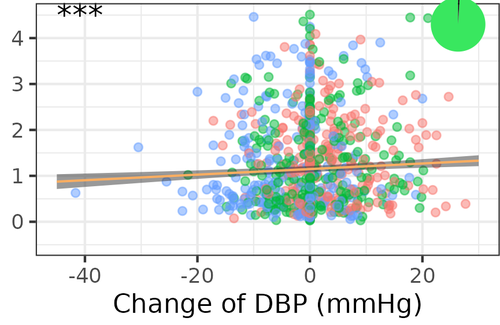Reviews: 2
Progression of white matter hyperintensities is related to blood pressure increases and global cognitive decline – a registered report
White matter lessions are associated with increases in blood pressure and global cognitive decline
Recommended by Chris Chambers based on reviews by Isabel Garcia GarciaCerebral small vessel disease (CSVD) is a common and multi-faceted set of pathologies that affect the small arteries, arterioles, venules and capillaries of the brain. The disease manifests through a range of symptoms and conditions, including psychiatric disorders, abnormal gait, and urinary incontinence, while accounting for 25% of strokes and nearly 50% of dementia.
The presence of CSVD is associated with white matter lesions detected as white matter hyperintensities (WMH) using neuroimaging, which have in turn been shown to predict future stroke, cognitive decline and dementia. While vascular risk factors of CSVD (such as hypertension and obesity) are also associated with CSVD, a complete picture of the predictive relationship between WMH, cognitive decline, and blood pressure remains to be determined, as does the role of sex/gender. These inter-relationships are important to determine for improving the diagnosis and treatment of CSVD.
In the current study, Beyer et al. analysed a large emerging dataset from the LIFE-Adult project – a longitudinal, two-wave, population-based study – to ask whether higher blood pressure predicts a greater increase in WMH, and whether progression of WMH is associated with measures of memory and executive function. In addition, the authors explored the relationship between abdominal obesity and WMH progression, and the extent to which WMH progression, and its interaction with vascular risk factors, depends on sex/gender.
Results revealed no reliable association between baseline blood pressure with WMH progression. WMH progression significantly predicted global cognitive decline but not decline in executive function specifically. Exploratory analyses revealed that increases in diastolic blood pressure as well as baseline and systolic blood pressure were associated with WMH progression, specifically in frontal periventricular regions, but there was no association of waist-to-hip ratio (a proxy of abdominal fat deposits) with WMH progression nor any gender-specific associations. The authors conclude that strict control of blood pressure might confer a protective effect, limiting WMH progression and negative effects on global cognitive function in the middle-aged to older population.
The Stage 2 manuscript was evaluated over one round of in-depth review. Based on responses to the reviewer's comments, the recommender judged that the manuscript met the Stage 2 criteria and awarded a positive recommendation.
URL to the preregistered Stage 1 protocol: https://osf.io/qkbgj
URL to the preregistered Stage 1 protocol: https://osf.io/qkbgj
Level of bias control achieved: Level 2. At least some data/evidence that was used to answer the research question had been accessed and partially observed by the authors prior to Stage 1 in-principle acceptance, but the authors certify that they had not yet observed the key variables within the data that were used to answer the research question.
List of eligible PCI RR-friendly journals:
References
1. Beyer, F., Lammer, L., Loeffler, M., Riedel-Heller, S., Debette, S., Villringer, A. & Witte, A. V. (2023). Progression of white matter hyperintensities is related to blood pressure increases and global cognitive decline – a registered report [Stage 2]. Acceptance of Version 2 by Peer Community in Registered Reports. https://osf.io/k24pm
06 Feb 2023

STAGE 1

Investigating the impact of vascular risk factors on the progression of white matter lesions
Understanding predictors of white matter lesions in the human brain
Recommended by Chris Chambers based on reviews by Max Elliott, Isabel Garcia Garcia and 1 anonymous reviewerCerebral small vessel disease (CSVD) is a common and multi-faceted set of pathologies that affect the small arteries, arterioles, venules and capillaries of the brain. The disease manifests through a range of symptoms and conditions, including psychiatric disorders, abnormal gait, and urinary incontinence, while accounting for 25% of strokes and nearly 50% of dementia.
The presence of CSVD is associated with white matter lesions (WML) detected using neuroimaging, which have in turn been shown to predict future stroke, cognitive decline and dementia. While vascular risk factors of CSVD (such as hypertension and obesity) are also associated with CSVD, a complete picture of the predictive relationship between WML, cognitive decline, and blood pressure remains to be determined, as does the role of sex/gender. These inter-relationships are important to determine for improving the diagnosis and treatment of CSVD.
In the current study, Beyer et al. will analyse a large emerging dataset from the LIFE-Adult project – a longitudinal, two-wave, population-based study – to ask whether higher blood pressure predicts a greater increase in WML, and whether progression of WML is associated with measures of memory and executive function. In addition, the authors will explore the relationship between abdominal obesity and WML progression, and the extent to which WML progression, and its interaction with vascular risk factors, depends on sex/gender.
The Stage 1 manuscript was evaluated over two rounds of in-depth review. Based on detailed responses to the reviewers' comments, the recommender judged that the manuscript met the Stage 1 criteria and therefore awarded in-principle acceptance (IPA).
URL to the preregistered Stage 1 protocol: https://osf.io/qkbgj
URL to the preregistered Stage 1 protocol: https://osf.io/qkbgj
Level of bias control achieved: Level 2. At least some data/evidence that will be used to answer the research question has been accessed and partially observed by the authors, but the authors certify that they have not yet observed the key variables within the data that will be used to answer the research question.
List of eligible PCI RR-friendly journals:
- Brain and Neuroscience Advances
- Cortex
- F1000Research
- In&Vertebrates
- NeuroImage: Reports
- Peer Community Journal
- PeerJ
- Royal Society Open Science
References
1. Beyer, F., Lammer, L., Loeffler, M., Riedel-Heller, S., Villringer, A. & Witte, V. (2023). Investigating the impact of vascular risk factors on the progression of white matter lesions, in principle acceptance of Version 2 by Peer Community in Registered Reports. https://osf.io/qkbgj


